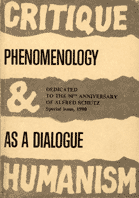The Dual Articulation of Social Forms and the New Sociology of Science
The Dual Articulation of Social Forms and the New Sociology of Science
Author(s): Karin Knorr CetinaSubject(s): Social Sciences
Published by: Фондация за хуманитарни и социални изследвания - София
Summary/Abstract: In recent years, we have witnessed a renewed interest in the „micro-macro question“, and we have seen a curious reapproachment of system-level perspectives with phenomenological and interpretative approaches. Theorists associated with functionalism, system theory or critical theory have found it worthwhile to deal in some detail with the more phenomenological, action-oriented and culturalist perspectives and have even borrowed some of their concepts and results . To be sure some discussions and uses of micro-level concepts seem more concerned with fending off the challenge provided by these perspectives rather than with genuinely confronting or incorporating their results. Nonetheless, there appears to be some realization that phenomenological, interactionist and culturalist perspectives have something to offer to theories of modern society. In this paper, I do not want to go over the various qualms system-level and conduct-level approaches have with each other. Rather, I want to approach the issue as one of building a generalized account of the empirical world. To begin with, I want to give a theoretical formulation to the bearing phenomenological, interactionist and culturalist perspectives have on such an account. I have in mind perspectives which go by the name of ethnomethodology, cognitive sociology, social phenomenology, symbolic interactionism, ethnogenics, ethnoscience, semiotic and symbolic anthropology, and the like. These perspectives are variously called “microsociological”, “hermeneutic”, “interpretative”, and the like. None of these labels quite fi ts, either because other theories are not appropriately excluded, or because the label is too restrictive in view of the many theoretical differences between these perspectives. Despite of these diff erences, one identifying characteristic of the approaches I have named surely is that they pay close attention to the empirical detail of ordinary social knowledge and conduct [1] in everyday life.
Journal: Критика и хуманизъм
- Issue Year: 1990
- Issue No: special
- Page Range: 102-128
- Page Count: 27
- Language: English
- Content File-PDF

